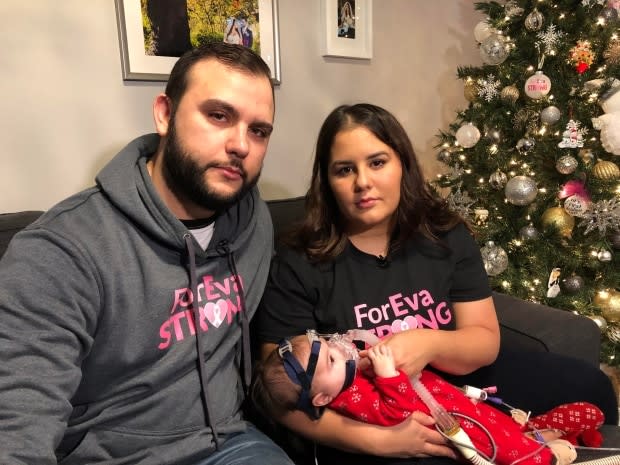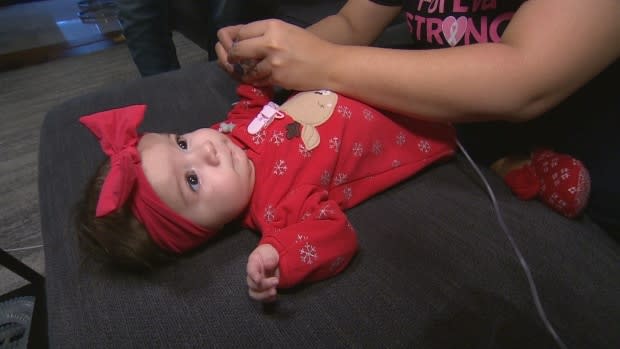Toronto parents of baby needing $2.8M drug turn to Swiss drugmaker's dose lottery as a last resort

Lying on the couch by the Christmas tree in her Toronto home, four-month-old Eva Batista begins to cry as her mom places a suction mask over her face to remove excess saliva building up in her throat.
Eva has spinal muscular atrophy, a rare, potentially deadly genetic disorder that weakens her muscles, making it difficult to breath at times or eat without the aid of tubes.
The only possible cure, a gene therapy called Zolgensma, costs $2.8 million for a one-time dose.
Eva's parents, Jessica and Ricardo Batista, have two hopes for obtaining the potentially life-saving treatment: either through an international dose lottery run by the Swiss manufacturer of Zolgensma or a long-shot fundraising campaign to raise the money themselves.
But they don't have much time.
Their daughter must get a dose before she turns two for it to work.
Eva was diagnosed with the disorder weeks after she was born, immediately setting her parents on a desperate search for a way to give her the best shot at life.
"It was overwhelming," Ricardo said of learning Eva's diagnosis. "It was kind of like [hitting] a brick wall."

Spinal muscular atrophy affects one out of every 8,000 to 10,000 people worldwide, according to the U.S. National Institutes of Health.
Zolgensma targets the root cause of the disease. The treatment would replace the function of the survival motor neuron 1 (SMN1 gene), which could eventually allow Eva to walk.
Novartis, the Swiss-based pharmaceutical company that produces the drug, tells CBC News it intends to seek Health Canada approval to sell Zolgensma here.
For now, the treatment is only available in the U.S.
'It should be based on need, not how lucky you are'
The Batistas are partly pinning their hopes on a lottery Novartis is opening on Jan. 2.
It will give out 100 free doses of Zolgensma to children under the age of two from countries where the treatment hasn't been approved.
The company tells CBC News its intention is for this to be a long-term commitment with additional doses added to the program based on patient need and the expansion of its manufacturing capacity.
But the method of distributing the drug based on a lottery system is facing backlash from some in the medical community.
"It should be based on need, not how lucky you are in a lottery," said Joel Lexchin, a health policy expert with the University of Toronto.
"This [cost of Zolgensma] is an example of drug companies exploiting people's desperation."
So far, the Batistas have raised more than $1.5 million through a Go Fund Me page and charity dinners to pay for a trip to the U.S. to buy Zolgensma on their own.
However, they're still short more than $1 million as the clock keeps ticking for Eva.

A spokesperson for Novartis tells CBC News its gene therapy is priced in the U.S. at approximately 50 per cent less than the current 10-year cost of chronic spinal muscular atrophy treatment, which stops working if a patient stops taking the medication.
"AveXis [a Novartis company] understands families grappling with an SMA diagnosis are in need of promising therapies and has been working to explore all options to provide access wherever possible," spokesperson Samantha Schwarz wrote in an email to CBC News.
"One-time treatment options, compared with reoccurring options over long periods of time, may reduce the burden of disease to patients, families, and the overall health-care systems by replacing repeat, lifetime therapy."
'That's not fair'
The Batistas want a shot at the Novartis lottery. But in order to apply, they have to prove Eva's current treatment is ineffective.
The requirement has befuddled her parents because the treatment they are currently administering, called Spinraza, can only slow down the symptoms, not reverse them.

Jessica and Ricardo said they can't understand why Eva should be denied a treatment that could drastically improve her life.
"I would understand a bit better if there wasn't any other alternative, but there is something out there," Jessica said.
"The fact that we can't get access to it. And so she's basically on her last breath — that's not fair."
'It's heartbreaking'
In the meantime, the Batistas can try to get Zolgensma through Health Canada's Special Access Program, but they face similar hurdles.
The Batistas said their doctor has not applied on Eva's behalf because Zolgensma is only granted when conventional therapies have failed. The parents say the doctor doesn't think Eva would have a strong case because she is on Spinraza.
"It's heartbreaking," said Marilyn Gladu, Conservative health critic and MP for the southern Ontario riding of Sarnia-Lambton.
"I would hope that the health minister would intervene with the Special Access Program to allow them to have this drug brought to Canada."

Gladu is calling for changes to Ottawa's approval process for restricted medications to speed up approvals and lower costs.
'We need a national framework for these orphan drugs'
NDP health critic Jenny Kwan said Eva's case highlights flaws in Canada's health-care system when it comes to what are known as orphan drugs, cutting-edge treatments for rare disorders for which there isn't enough of a market to make them commercially viable without government funds.
"I think this case speaks to exactly the reason why we need a national framework for these orphan drugs," said Kwan, the MP for Vancouver East.
"Nobody should have to depend on the luck of the draw in Canada to access life-saving medication. We're better than that."
The NDP is pushing for a universal pharmacare program that includes access to drugs that treat rare diseases.

In a statement to CBC News, Thierry Bélair, a spokesperson for Health Minister Patty Hajdu, said the federal government made a commitment in 2019 to spend $500 million per year to help Canadians with rare diseases access drugs not yet approved.
Part of the money is going toward the creation of a national strategy to gather evidence on high-cost drugs for rare diseases and help negotiate lower prices.
"Canadians with rare diseases and those who care for them face unimaginable challenges," Bélair wrote. "Our government is committed to getting them the help they need."
As Ottawa works on a plan, time is running out for Eva and her parents.
"It's not a game," Ricardo said. "If there is something available, why do we have to wait till she's failing and in her last moments?"


